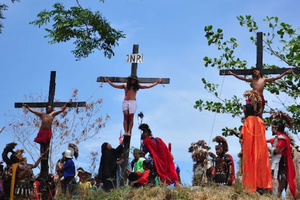Holy Week Is a Time to Think About Christmas
The Paschal mystery and the Incarnation are profoundly connected.

March 25 is usually the Solemnity of the Annunciation, commemorating when the angel Gabriel gave Mary her vocation to be the Mother of Jesus. But astute Catholics might notice it’s missing from this year’s liturgical calendar. March 25 was just “Monday during Holy Week” — and the Annunciation won’t be celebrated until April 8.
There’s some obvious wisdom in the Church’s calendar. Holy Week gears up for the very un-festive occasion of Jesus’ brutal torture and agonizing death. Celebrating with the usual feastings of a Solemnity feels … wrong, somehow.
But just because there’s no liturgical celebration doesn’t mean we can’t think about the Annunciation this week, at the time when it’s usually commemorated.
Just the opposite, in fact — we can gain much profit from contemplating the diverging feasts of Holy Week and the Annunciation simultaneously. These feasts are so very different in tone and feeling. But one doesn’t stand without the other.
The Annunciation takes us back to Christmas and the circumstances of Jesus’ conception and birth. Holy Week takes us forward to his death, burial and resurrection. In most people, birth and death are connected only as the necessary bookends of biological life. But in Jesus, they are baked into his very identity as Son of God and Son of Man. The Venerable Fulton Sheen said it well: “Every other person who ever came into this world came into it to live. He came into it to die.”
Christ’s mission was the Paschal Mystery, the doorstep of which we are now on. These days are the holiest of our year because they are the most central to everything we believe as Christians. Jesus Christ was crucified, died, was buried, and on the third day rose from the dead. And his death and resurrection saved us. It freed us from evil; showed us the truth of God and ourselves; and promised us eternal paradise.
Jesus’ death and new life accomplished this salvation because he was God himself. But Jesus’ death and resurrection accomplished this salvation for us because he was also man like us. The Incarnation — God becoming man, and born as a little baby — is not just a necessary chronological step to the ultimate end of Jesus’ death. Christ became man, lived as a man, and died as a man. So that when he was raised, he would be raised as a man. Holy Week is meaningful only because of who Jesus is, and Jesus is who he is only through the Incarnation.
This might seem unimportant to us today, perhaps because it seems so obvious. But for centuries of Christian history, it was anything but. The fact that God could become man, and then suffer and die, was (and should still be) a great scandal. God is as far removed from suffering as possible. He is perfect, infinite, all-powerful and all-good. Suffering is an evil, a weakness, a sign of imperfection, and possible only in lowly finite beings. Claiming that God became man only to suffer and die sounds, to the ears of any sensible person, like a bunch of foolishness (1 Corinthians 1:23).
The early Church faced this contrast in the Docetist heresy. Docetism couldn’t stand this tension and refused to acknowledge Jesus as true man. He was God, but only in the appearance of man. Maybe just as a ghost or an illusion; or maybe as some kind of puppeteer, controlling the body of Jesus like a remote-controlled car.
Docetism itself was rejected by the Church Fathers, and by the Council of Nicea was universally condemned. But the spirit of the heresy lived on, in a variety of errors that tried to separate Jesus’ Incarnational unity.
One of the most consequential was Nestorianism, which led to a schism between the Syriac and Catholic/Orthodox Churches. Nestorius admitted Jesus was really human and really divine. But Nestorians separated these two natures into two distinct persons, a human person and a divine person. Because of this, Nestorius denied that Mary was the Mother of God, instead calling her the Mother of Christ.
This is another reason to remember the Annunciation this time of year: It connects us to Mary. Nestorianism was rejected at the Council of Ephesus — not primarily by theological definitions of Jesus’ natures and person, but by affirmation of Mary as the Mother of God. Jesus’ Incarnation is essential to understanding the Paschal Mystery, and Mary helps us understand the Incarnation.
This is why we think of her a lot during Christmastime. Too little, perhaps, do we think of her during Holy Week. But she was there the whole time, suffering with her Son. She endured the agony of watching her beloved tortured to death. She faced the jeers of the crowds and the roughness of the soldiers. And she likely wrestled with a level of spiritual warfare that we may never be able to comprehend. In both her role this week, as well as her role at the start of Jesus’ human existence, she points us to her Son. One Incarnational unity, God and man — suffering, dying and raised again for our salvation.
It's a beautiful thing, then, to have the Annunciation fall during Holy Week. They are connected in deeply important ways. This understanding of these bookends of Jesus’ life is a precious thing, won in the long theological battles of our ancestors in the Faith. And both feasts should connect us to Mary, who will in turn bring us to Jesus.
So this Holy Week, don’t forget the Annunciation. In the midst of the sorrow and drama of the Passion, think also of the warmth and tenderness of Christmas. Because they both belong to the same person, Jesus Christ: the God who became man — who suffered as man — for love of you.
- Keywords:
- holy week
- annunciation
- christmas

















